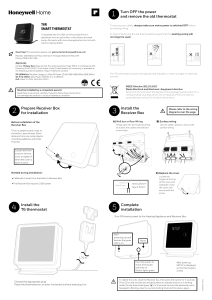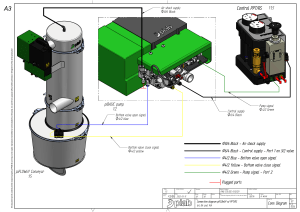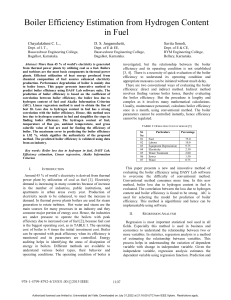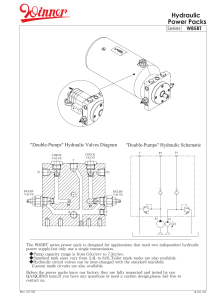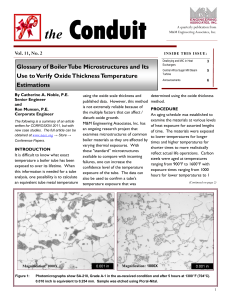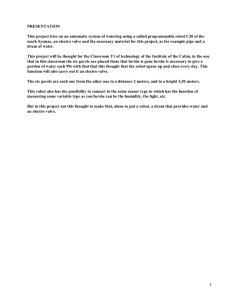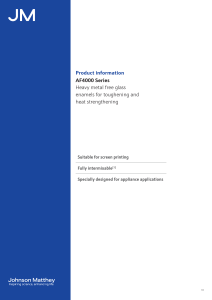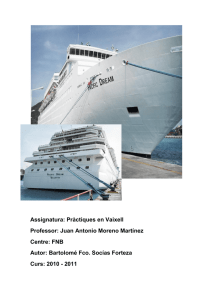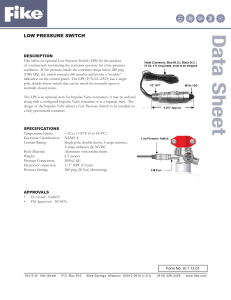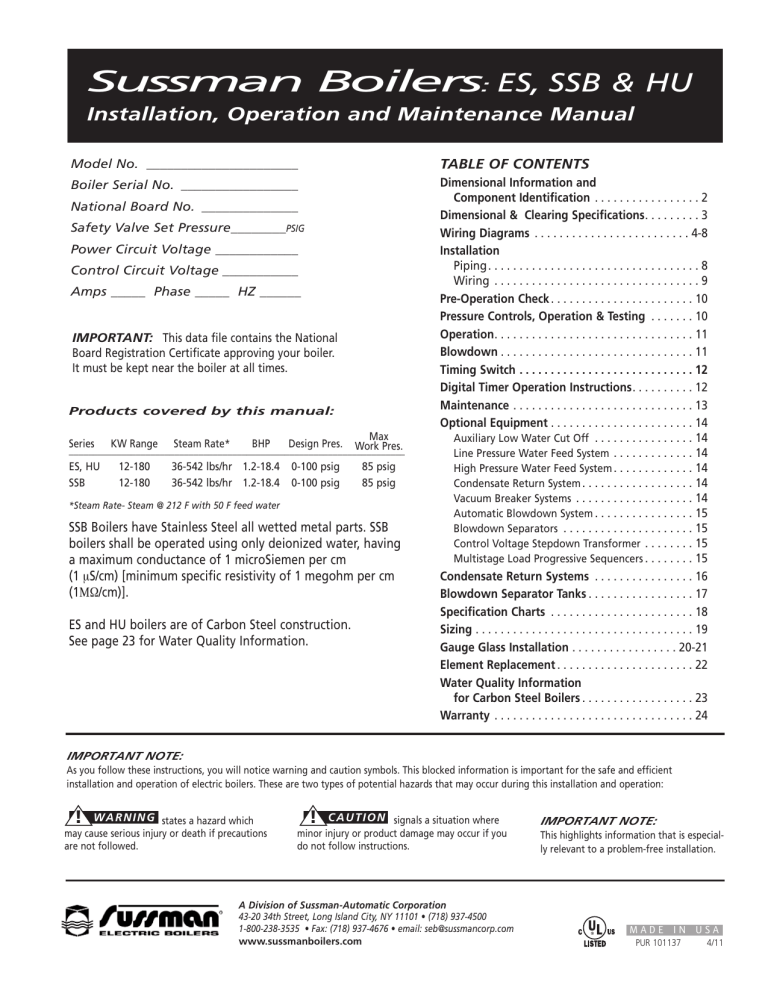
Sussman Boilers: ES, SSB & HU Installation, Operation and Maintenance Manual Model No. ______________________ TABLE OF CONTENTS Boiler Serial No. _________________ Dimensional Information and Component Identification . . . . . . . . . . . . . . . . . 2 Dimensional & Clearing Specifications. . . . . . . . . 3 Wiring Diagrams . . . . . . . . . . . . . . . . . . . . . . . . . 4-8 Installation Piping. . . . . . . . . . . . . . . . . . . . . . . . . . . . . . . . . . 8 Wiring . . . . . . . . . . . . . . . . . . . . . . . . . . . . . . . . . 9 Pre-Operation Check . . . . . . . . . . . . . . . . . . . . . . . 10 Pressure Controls, Operation & Testing . . . . . . . 10 Operation. . . . . . . . . . . . . . . . . . . . . . . . . . . . . . . . 11 Blowdown . . . . . . . . . . . . . . . . . . . . . . . . . . . . . . . 11 Timing Switch . . . . . . . . . . . . . . . . . . . . . . . . . . . . 12 Digital Timer Operation Instructions. . . . . . . . . . 12 Maintenance . . . . . . . . . . . . . . . . . . . . . . . . . . . . . 13 Optional Equipment . . . . . . . . . . . . . . . . . . . . . . . 14 Auxiliary Low Water Cut Off . . . . . . . . . . . . . . . . 14 Line Pressure Water Feed System . . . . . . . . . . . . . 14 High Pressure Water Feed System . . . . . . . . . . . . . 14 Condensate Return System . . . . . . . . . . . . . . . . . . 14 Vacuum Breaker Systems . . . . . . . . . . . . . . . . . . . 14 Automatic Blowdown System . . . . . . . . . . . . . . . . 15 Blowdown Separators . . . . . . . . . . . . . . . . . . . . . 15 Control Voltage Stepdown Transformer . . . . . . . . 15 Multistage Load Progressive Sequencers . . . . . . . . 15 Condensate Return Systems . . . . . . . . . . . . . . . . 16 Blowdown Separator Tanks . . . . . . . . . . . . . . . . . 17 Specification Charts . . . . . . . . . . . . . . . . . . . . . . . 18 Sizing . . . . . . . . . . . . . . . . . . . . . . . . . . . . . . . . . . . 19 Gauge Glass Installation . . . . . . . . . . . . . . . . . 20-21 Element Replacement . . . . . . . . . . . . . . . . . . . . . . 22 Water Quality Information for Carbon Steel Boilers . . . . . . . . . . . . . . . . . . 23 Warranty . . . . . . . . . . . . . . . . . . . . . . . . . . . . . . . . 24 National Board No. ______________ Safety Valve Set Pressure________PSIG Power Circuit Voltage ____________ Control Circuit Voltage ___________ Amps _____ Phase _____ HZ ______ IMPORTANT: This data file contains the National Board Registration Certificate approving your boiler. It must be kept near the boiler at all times. Products covered by this manual: Max Series KW Range Steam Rate* BHP Design Pres. Work Pres. ______________________________________________________________________ ES, HU 12-180 36-542 lbs/hr 1.2-18.4 0-100 psig 85 psig SSB 12-180 36-542 lbs/hr 1.2-18.4 0-100 psig 85 psig *Steam Rate- Steam @ 212 F with 50 F feed water SSB Boilers have Stainless Steel all wetted metal parts. SSB boilers shall be operated using only deionized water, having a maximum conductance of 1 microSiemen per cm (1 µS/cm) [minimum specific resistivity of 1 megohm per cm (1ΜΩ/cm)]. ES and HU boilers are of Carbon Steel construction. See page 23 for Water Quality Information. IMPORTANT NOTE: As you follow these instructions, you will notice warning and caution symbols. This blocked information is important for the safe and efficient installation and operation of electric boilers. These are two types of potential hazards that may occur during this installation and operation: ! WA R N I N G states a hazard which may cause serious injury or death if precautions are not followed. ! C A U T I O N signals a situation where minor injury or product damage may occur if you do not follow instructions. A Division of Sussman-Automatic Corporation 43-20 34th Street, Long Island City, NY 11101 • (718) 937-4500 1-800-238-3535 • Fax: (718) 937-4676 • email: seb@sussmancorp.com www.sussmanboilers.com IMPORTANT NOTE: This highlights information that is especially relevant to a problem-free installation. MADE IN USA PUR 101137 4/11 Sussman Boilers Installation, Operation & Maintenance Manual Dimensional Information & Component Identification Models: ES, HU, SSB Height Width Length _________________________________ SYMBOL ITEM ES12-18 ES24-72 ES100 ES135-180 ___________________________________ _______________________________________ WATER STEAM MODEL H W L INLET OUTLET _______________________________________ Height Overall Height 36" 44" 59" 61" __________________________________________________________________ Length Overall Length 28" 33" 34" 38" __________________________________________________________________ Width Overall Width 20" 22" 26" 30" __________________________________________________________________ A Steam Outlet 6-1/4" 10" 8-1/4" 9" __________________________________________________________________ B Steam Outlet 10-1/4" 17" 17-1/4" 18-1/4" __________________________________________________________________ C M/M Drain Valve 5" 12" 17" 16-3/4" __________________________________________________________________ D M/M Drain Valve 6-1/2" 6" 6-1/4" 6-1/4" __________________________________________________________________ E Check Valve 14" 9" 17" 16-3/4" __________________________________________________________________ F PV Drain Valve 2-3/4" 2-1/4" 2-3/4" 2-3/4" __________________________________________________________________ G PV Drain Valve 6-1/4" 9-1/2" 7-3/4" 9-1/4" __________________________________________________________________ J Clearance 3-3/4" 3-1/2" 4" 4" __________________________________________________________________ K Check Valve 2-1/2" 2-3/4" 3" 3" __________________________________________________________________ M Door Width 8-3/4" 14" 12-3/4" 14-3/4" __________________________________________________________________ ES 12, 18; HU 40–55 36" 20" 28" 1/2” NPT 1/2”NPT _________________________________________________ ES 24–72; HU 75–205 44" 23" 33" 1/2”NPT 1” NPT _________________________________________________ ES 100; HU 310 59" 28" 34" 1/2”NPT 1-1/2”NPT _________________________________________________ ES 135–180; HU 410–550 61" 30" 36" 1/2”NPT 2” NPT _________________________________________________ SSB 12–18 36" 20" 28" 1/2”NPT 1/2”NPT _________________________________________________ SSB 24–72 45" 27" 33" 1/2”NPT 1” NPT _________________________________________________ SSB 80–100 59" 28" 34" 1/2”NPT 1-1/2”NPT _________________________________________________ SSB 135–180 61" 30" 36" 1/2”NPT 2” NPT _______________________________________ Allow minimum 21 inches clearance in front of door for servicing of heating elements. Recommended clearance: 24 inches all around boiler for servicing. Allow 24 inches all around for servicing. 2 Sussman Boilers Installation, Operation & Maintenance Manual Dimensional & Clearance Specifications High Limit Pressure Control Operating Pressure Control Steam Outlet A Pressure Gauge Safety Valve On/Off Switch Gauge Glass Assembly Height D Liquid Level Control ER EL B Water Feed Inlet Drain Valve Left Front Width F Length Side Elevation Front Elevation Allow 24" all around for servicing. __________________________________________________ Clearance from combustible surfaces __________________________________________________ A 1" Clearance above top of boiler _________________________________________________________________________ B A Clearance from Front of boiler. Prefix "C" to numeral indicates acceptability for closet or alcove installations; prefix acceptability for alcove installations but not for closet installations. _________________________________________________________________________ D 1" Clearance from back of boiler. _________________________________________________________________________ EL 1" Clearance from left side of boiler. _________________________________________________________________________ ER 16" Clearance from right side of boiler. _________________________________________________________________________ F C Indicates type of flooring: "NC" for non-combustible; "C" for combustible. _________________________________________________________________________ G Total minimum free area in square inches of close ventilating openings. _________________________________________________________________________ 3 Sussman Boilers Installation, Operation & Maintenance Manual Typical Wiring Diagrams: a. b. c. d. e. f. Three phase power circuit with separate 120Volt control circuit. (With singe phase power circuit insert.) Three phase power circuit with step down transformer. Detailed ES81017/81017MR auxiliary low water cut off wiring. Detailed SSB auxiliary low water cut off wiring. ES81600 Auto blowdown wiring diagram. Detailed sequencer package wiring diagram. Wiring Diagram Control Circuit ES and SSB Electric Boilers (Basic Control Circuit) 120V 1PH INPUT L N FIELD WIRING FACTORY WIRING CONTROL TERMINAL BLOCK L1 L2 ON-OFF SWITCH PILOT LIGHT S M SOLENOID VALVE PUMP MOTOR R RELAY L LIQUID LEVEL CONTROL C1 P1 P2 HIGH LIMIT PRESSURE CONTROL OPERATING PRESSURE CONTROL 4 C2 CONTACTORS Sussman Boilers Installation, Operation & Maintenance Manual Wiring Diagram Control Circuit ES and SSB Electric Boilers (Power Circuit) FIELD WIRING THREE PHASE MAIN POWER SUPPLY TB 1 SINGLE PHASE MAIN POWER SUPPLY FACTORY WIRING L1 L2 TERMINAL POWER BLOCK (see note 1) L1 G L2 L3 PILOT LIGHT G TB POWER FUSES (see Note 2) FB2 FB1 FB3 FB4 480V FB T1 120V C1 CONTACTORS TRANSFORMER (optional) C2 C3 C4 C TO CONTROL CIRCUIT HEATING ELEMENTS H1 NOTES: 1. Power Terminal Block only on boilers with two or more contactors 2. Power Fuses only on boilers rated 120 amperes and larger. 3. See Parts List for contactor and heating element information. H3 H5 H7 H H2 H4 H6 H8 ES Electric Boilers with Manual Reset Auxiliary Low Water Cutoff 120V 1PH INPUT L N CONTROL TERMINAL BLOCK FIELD WIRING FACTORY WIRING ON-OFF SWITCH PILOT LIGHT S M SOLENOID VALVE PUMP MOTOR R RELAY C1 L L2 AUX LWCO PC BOARD GND LOW RESET LIQUID LEVEL CONTROL L1 G P1 P2 C2 HIGH LIMIT PRESSURE CONTROL OPERATING PRESSURE CONTROL CONTACTORS NC PILOT LIGHT COM NO MANUAL RESET TO PROBE 5 Sussman Boilers Installation, Operation & Maintenance Manual Wiring Diagram Control Circuit ES and SSB Electric Boilers with Sequencer 120V 1PH INPUT N L CONTROL TERMINAL BLOCK ON-OFF SWITCH FIELD WIRING FACTORY WIRING L2 L1 PILOT LIGHT S M SOLENOID VALVE PUMP MOTOR R RELAY L LIQUID LEVEL CONTROL COM 120V P1 P2 HIGH LIMIT PRESSURE CONTROL OPERATING PRESSURE CONTROL M 1 C1 2 C2 3 C3 4 PROPORTIONING PRESSURE CONTROL 135 OHM C4 CONTACTORS COM P3 SEQUENCER ES Electric Boiler with Auxiliary Low Water Cutoff 120V 1PH INPUT L N CONTROL TERMINAL BLOCK FIELD WIRING FACTORY WIRING ON-OFF SWITCH PILOT LIGHT S M RELAY SOLENOID VALVE PUMP MOTOR R C1 L L2 LIQUID LEVEL CONTROL G GND LOW RESET AUX LWCO PC BOARD L1 P1 P2 HIGH LIMIT PRESSURE CONTROL OPERATING PRESSURE CONTROL NC COM NO TO PROBE 6 C2 CONTACTORS Sussman Boilers Installation, Operation & Maintenance Manual Wiring Diagram Control Circuit ES and SSB Electric Boilers with Automatic Blowdown System 120V 1PH INPUT L N FIELD WIRING FACTORY WIRING CONTROL TERMINAL BLOCK T D PILOT LIGHT 2 7-DAY 24-HR TIMER 1 CLOSE 3 ES81600 AUTOMATIC BLOWDOWN SYSTEM ON-OFF SWITCH OPEN MOTORIZED BLOWDOWN VALVE TIME DELAY RELAY PILOT LIGHT S M SOLENOID VALVE PUMP MOTOR R RELAY C1 L LIQUID LEVEL CONTROL P1 P2 C2 HIGH LIMIT PRESSURE CONTROL OPERATING PRESSURE CONTROL CONTACTORS SSB Electric Boilers with Auxiliary Low Water Cutoff Hot Leg Neutral 120V 1PH INPUT FIELD WIRING FACTORY WIRING CONTROL TERMINAL BLOCK S SOLENOID VALVE ON-OFF SWITCH PILOT LIGHT RELAY R C1 L LIQUID LEVEL CONTROL L1 L2 LO PROBE GUARD GROUND LWCO LWCO AUX LWCO BOARD BOILER SHELL 7 P1 P2 C2 HIGH LIMIT PRESSURE CONTROL AUTOMATIC PRESSURE CONTROL CONTACTORS Sussman Boilers Installation, Operation & Maintenance Manual Wiring Diagram Control Circuit SSB Electric Boilers with Manual Reset, Auxiliary Low Water Cutoff 120V 1PH INPUT L N FIELD WIRING FACTORY WIRING CONTROL TERMINAL BLOCK S SOLENOID VALVE ON-OFF SWITCH PILOT LIGHT RELAY R C1 L LIQUID LEVEL CONTROL L1 LLCO L2 G P1 P2 C4 HIGH LIMIT PRESSURE CONTROL AUTOMATIC PRESSURE CONTROL CONTACTORS NC LO PROBE COM L1 L2 GUARD GROUND RESET NO LWCO LWCO AUX LWCO BOARD MANUAL RESET BOILER SHELL Installation REFER TO NATIONAL AND ALL APPLICABLE LOCAL CODES FOR SPECIFIC INSTALLATION REQUIREMENTS. 1. The boiler should be mounted on a solid, level foundation. 2. The boiler should be located with suitable clearances, refer to page 3 and Code requirements. NOTE: Allow minimum of 21 inches clearance in front of door for servicing of heating elements. Piping ALL PIPING SHOULD BE INSTALLED BY A QUALIFIED LICENSED PLUMBER IN ACCORDANCE WITH NATIONAL AND LOCAL CODES. 1. When water feed is other than pump type the water supply pressure must be 10 psig greater than boiler operating pressure to assure water supply maintains proper water level in the boiler. Insufficient water levels can result in improper boiler operation. (Keep feed water valves open at all times during normal operation.) 2. If pump and boiler are plumbed within 30 feet (pipe length) a minimum of 2 check valves are required to avoid damage to pump. 8 3. Connect steam line with customer supplied outlet valve to boiler steam outlet. 4. Provide for boiler drain connection, a daily blowdown is required. A "Blowdown Separator Tank" may be necessary, check with local code. 5. Safety valve shall be plumbed according to local code. NOTE: The safety valve shall not be plumbed with a line sized less than the outlet size of the safety valve. Sussman Boilers Installation, Operation & Maintenance Manual Wiring ALL ELECTRICAL WIRING MUST BE PERFORMED BY A QUALIFIED ELECTRICIAN IN ACCORDANCE WITH NATIONAL AND LOCAL ELECTRICAL CODES. ! C A U T I O N Assure that the power voltage and phase being supplied to the boiler matches the power voltage and phase of the boiler. Connecting incorrect power supply can damage boiler components or cause improper boiler operation. If the boiler power requirements do not match the power to be supplied to the boiler the boiler must be returned to the factory for conversion. Boilers cannot be field converted. ALL BOILERS ARE PRE-WIRED AND TESTED PRIOR TO SHIPMENT. 1. Ground boiler according to National Electric Code requirements to avoid shock. 5. If a separate control circuit is used, it should be connected to the control circuit terminal block. 2. Power wiring to boiler should be in accordance with National and Local Electrical Code requirements following wiring diagram supplied. Use proper size wire. Wire size is specified adjacent to field wiring terminals. This label states the wire size [AWG or MCM], minimum temperature rating (90 C) and conductor material (copper only). Deviation from these requirements may result in improper or unsafe boiler operation. 6. Remote mounted water feed systems (i.e. condensate return, motor and pump) should be connected to the junction box provided on the outside of the boiler jacket. 3. A disconnect switch employing circuit breakers or fuses should be installed between the main power source and the boiler. This disconnect switch should be located near the boiler and clearly marked for easy access and identification should the boiler need to be turned off due to an emergency. 4. Boiler control circuit is 120 Volt*. Unless boiler has an optional step down transformer, a separate 120 Volt power feed wiring is required to be connected to the control circuit terminal block. A 15 Amp circuit is required for all boilers. If a 3/4 HP feed water motor and pump assembly is connected to the boiler, then a 20 Amp circuit is required. 7. With main power off, make sure all wiring terminations are tight to avoid arcing, carbonizing or overheating of contacts. ! CAUTION ! WA R N I N G Substitution of components or modifi- Boilers are susceptible to lightning damage due to water line connections. An industrial type lightning/surge protector should be installed according to the manufacturer's recommendation at the service entrance. Consult your contractor or electrical dealer. cation of wiring system voids the warranty and may lead to dangerous operating conditions. 9 Sussman Boilers Installation, Operation & Maintenance Manual Pre-Operation Check (All Boilers) LWCO/PUMP CONTROL OPERATION AND TESTING 1. All valves for incoming water supply are to be fully opened. Main disconnect switch is to be in the "on" position. Boiler main switch is to be in the "on" position. Since boiler will be empty the pump or solenoid will be energized allowing the boiler to fill with water. Control will automatically fill boiler to proper operating water level and the pump/solenoid will be de-energized. Contactors will then energize, applying voltage to the heating elements. Boilers equipped with an auxiliary low water cut-off control with a manual re-set button (required as mandatory equipment is some states): once the correct operating water level has been reached, it will be necessary to depress the reset button in order for the contactors to re-energize. Note: For boilers equipped with an automatic blowdown system: 2. Pump switch operation – at this point water should be visible • For test 1 - the blowdown time clock must be in the approximately half way up the sight glass. Slowly open the “run” mode before the boiler will automatically drain valve located at the bottom of the boiler. Water level in fill. the sight glass will begin to drop, allowing the low water cut off/pump control to energize the feed water system. Close valve • For test 2 and 3 - in order for the drain valve to open the blowdown clock must be in the “off” mode. for proper operation. (See blowdown time clock insert) The automatic 3. Low water cutout switch performance – open the drain valve blowdown indicator light will be on when the completely. Maintain this condition until water level falls within valve is open. This light will remain on for the the gauge glass enough to cause the low water cutout switch to duration of the blowdown cycle (a few seconds). It de-energize the heating elements. All of the contactors will be may be necessary to cycle the time clock from the in a de-energized or open state at this time. Close the drain “run” to “off” mode several times. valve, water feed system will automatically refill the boiler and the contactors will re-energize. Pressure Controls, Operation and Testing Note: All boilers are provided with one high limit pressure control and at least one operating pressure control. 4. Operating pressure control check: Close steam outlet valve [supplied by customer] and adjust operating pressure control to 20psig and the differential to 10psig. Set the high limit pressure control to 30psig. Switch 1. The high limit pressure control is equipped with a manual boiler on to allow steam pressure to build-up. Pressure reset feature. There is no subtractive differential scale gauge reading will increase and the operating pressure with this type of control control will de-energize the contactor(s) when the pressure gauge indicates 20psig. Open steam outlet valve 2. All pressure controls are equipped with an adjusting to bleed off pressure. When the pressure gauge readscrew, allowing for setting of desired operational and ing decreases below 10psig (differential) the operating high limit pressures. To reduce pressure setting, turn pressure control will re-energize the contactor(s). adjusting screw in direction that allows indicator to point to a lower pressure setting on the scale. To increase pres- 5. High limit pressure control check: FOR TEST PURPOSES sure setting turn adjusting screw in direction that allows ONLY! Set the high limit pressure control 10psig lower indicator to point to a higher pressure on the scale than the operating pressure control. Close the steam outlet valve and switch the boiler on to allow boiler to Note: It is recommended that the high limit control be set build pressure. When the pressure gauge indicates the 10psig above the desired normal operating pressure. pressure at which the high limit pressure control is set, the high limit pressure control re-set button will pop3. Operating pressure controls, except low pressure (15psig) up and the control will de-energize the contactor(s). types have a separate differential scale. Differential indiOpen the steam outlet valve to bleed off pressure. The cates pressure below the main operating maximum prescontactor(s) should not re-energize on pressure drop. sure, the pressure control will re-set. The differential set The contactor(s) should only re-energize when the prespoint is adjusted in the same manner by turning the sure has dropped and the high limit pressure control adjusting screw in the desired direction to increase or reset button is depressed. decrease the differential pressure value. 10 Sussman Boilers Installation, Operation & Maintenance Manual Operation ! CAUTION With main disconnect “OFF” tighten all electrical connections before energizing boiler to prevent arcing, carbonizing of contact and/or overheating 1. 2. 3. 4. 5. 6. Boiler steam pressure will gradually increase to the operating pressure control set point, at which time the contactor(s) will de-energize. 7. With steam demand, the boiler steam pressure will decrease. When the boiler pressure has dropped Set the desired operating pressure and differential pressure below the operating pressure control differential set on the operating pressure control. amount, the contactor(s) will re-energize. Set the high limit pressure control. (Recommended to be 10 8. The boiler is equipped with float type liquid level conpsig above the operating pressure setting.) trols employing micro switches. They are extremely Turn on water supply. sensitive and reliable and will maintain the proper Turn main disconnect switch on. water level within the boiler pressure vessel automatically during boiler operation. Turn boiler control switch on. The water feed will begin and continue until the water level reaches half way up the gauge 9. The boiler should be blown down daily. (See blowglass. The water feed will automatically shut off and the condown instructions.) tactor(s) will energize. Blowdown A daily blowdown is an essential part of boiler operation. It is the best and most important part of preventative maintenance you can give your boiler and will add years of life to the unit. Make sure a blowdown schedule is established and followed regularly. In extremely hard water areas, blowdown may be necessary more than once a day. If there is a particular problem that applies to your local water condition (i.e. high concentrations of minerals etc.) we recommend a consultation with a reputable local water treatment-engineering firm. Pre-treating the boiler feed water may reduce mineral accumulation enough to allow a daily blowdown to be sufficient. MANUAL BLOWDOWN INSTRUCTIONS 1. At the end of the working day, while boiler is still operating, turn boiler main switch to the “OFF” position, close water supply valve and open disconnect switch. AUTOMATIC BLOWDOWN INSTRUCTIONS (PN ES81600) 1” NPT, Starts, stops and blows down the boiler automatically, utilizing a programmable time clock a time-delay relay and motorized ball valve. 2. If blow down valve is plumbed into a blowdown tank, ! C A U T I O N If the blowdown valve is plumbed into a blowthe boiler can be discharged at operating pressure. down tank, the boiler can be discharged at operating pressure. If the blowdown valve is not plumbed into a blowdown tank, consult 3. If the blowdown valve is not plumbed into a blowdown tank, consult with local plumbing codes regard- with local plumbing codes regarding boiler discharge. ing boiler discharge. NOTE: The manual valves from the boiler drain and the lower 4. When discharge is complete and boiler is drained, float control equalization tube must be fully open for the automatclose the blowdown valve, open the water supply ic blowdown to be effective. valve, turn boiler main switch to “ON” position and 1. Program time clock by setting the time boiler is to turn on and close disconnect switch. off daily. (Refer to instructions in time clock insert.) 5. When refilling is complete, turn off the boiler unless 2. When the time clock turns the boiler “off” the blowdown is actifurther operation is needed. vated. A red pilot light over the time clock will come on and 6. If boiler is equipped with a “Manual Re-set Auxiliary remain on while the motorized ball valve is open. The time duraLow Water Cut-off” (as required in some states) the tion the valve is open is set by an adjustable potentiometer built re-set button must be pushed before the boiler will into the time delay board. The water level in the boiler after begin developing steam. Do not push re-set button blowdown is complete, will be approximately at the lower gauge until the boiler has refilled with water. glass valve. (Elements are not exposed to air between operations.) NOTE: THE USE OF CHEMICAL BOILER CLEANING 3. Boiler will automatically refill at next programmed on cycle. COMPOUNDS IN THESE BOILERS VOIDS ALL WARBlowdown program can be overridden to allow for unscheduled RANTIES. SOME COMPOUNDS CAN/WILL DAMAGE blowdown or operational cycles. Refer to the time clock instruction INCOLOY SHEATHED HEATING ELEMENTS AND insert. SHORTEN THE LIFE OF THE ELEMENTS. 11 Sussman Boilers 24-Hour and 7-Day Time Switches Installation, Operation & Maintenance Manual Digital Timer - Operation Instructions PROGRAMMING For electric steam boilers equipped with Automatic Blowdown Systems ES 81600, refer to the following instructions for time clock operation and settings. Timer settings for blowdown operation are at the discretion of the owner/operator. The weekly program dial shows the seven days of the week and AM/PM imprints for each day. The time switch is set by pushing the captive trippers to the outer ring position for the entire period that the load is to be turned ON, i.e., 2 hours to each tripper on the 7-day dial. When the tripper is pushed to the inside, the switch is in the OFF position. SETTING TIME To set the current time and day of week, turn the minute hand clockwise. Do not set the time by rotating “Outer” Dial. Turn the minute hand clockwise until the day of the week and the time of day on the outer dial is aligned with the triangle marker on the inner dial (two o'clock). Example for 7-day program dial Monday 10:30 AM.Turn the minute hand clockwise until Monday 10:30 AM is aligned with the triangle on the inner dial.The hour and minute hand will show exactly 10:30. FOR MANUAL OVERRIDE Manual override can be accomplished at the discretion of the owner/operator as follows. 3-WAY MANUAL OVERRIDE SWITCH I = permanent ON = automatic O = permanent OFF I O IMPORTANT: It is recommended that for periodic and effective blowdown,the override switch be set in the automatic setting. 14 16 Mo Tu We Th Fr Sa Su 18 20 22 24 + - Res. Menu OK +1h TO SET TIME & DAY OF CLOCK 1. Press Menu 2. 24h AM or PM blinking, press + or – to select, press OK 3. Hour (12:00) blinking, press + or – to select, press OK 4. Minute (12:00) blinking, press + or – to select, press OK 5. Arrows for days blinking, press + or – to select, press OK 6. Go to step 8 to continue with programming or press Menu to end. TO SET TIMER ON/OFF TIMES 7. Press Menu and press OK four times to go current time/day setting above 8. Prog 01 blinking and ON symbol displayed, press + or – to select, press OK 9. Hour (12:00) blinking, press + or – to select, press OK 10. Minute (12:00) blinking, press + or – to select, press OK 11. Arrows for days blinking, press + or – to select, press OK 12. Prog 02 blinking and OFF symbol displayed, press + or – to select, press OK 13. Hour (12:00) blinking, press + or – to select, press OK 14. Minute (12:00) blinking, press + or – to select, press OK 15. Arrows for days blinking, press + or – to select. See possible combinations below. 16. Press Menu to end or press OK and repeat steps 8 to 15 to set more ON/OFF times. PROGRAMMED DAY COMBINATIONS: Every day (arrows on all days) Monday to Saturday Monday to Friday Saturday and Sunday Any individual day 12 Sussman Boilers Installation, Operation & Maintenance Manual Maintenance ! CAUTION HAZARD OF ELECTRIC SHOCK. DISCONNECT ALL ELECTRICAL POWER BEFORE WORKING ON BOILER. Sussman Electric Steam Boilers are designed for years of trouble-free performance. To establish a good preventative maintenance program, we suggest that the facility maintenance person or engineer familiarize themselves with these simple rules. 1. The use of chemical boiler cleaning compounds voids all warranties and should not be used. Some compounds can/will damage the incoloy sheathing of the heating elements. A reputable water treatment-engineering firm should be consulted regarding pretreating or conditioning the boiler feed water. 2. Daily blowdown at pressure is essential for ideal boiler performance. Extended periods of operation may require more frequent blowdown. If the boiler is not equipped with an automatic blowdown, in order to safeguard the heating elements, it is recommended to turn both the main disconnect switch and the boiler switch to the off position before manually blowing down the boiler. 3. The sight glass should be checked frequently to assure the boiler has adequate water. 4. The sight glass should be checked daily for damage (i.e. scratches, erosion, leaks etc.) The sight glass should be replaced if damaged. (See insert.) 5. A monthly inspection should be made of the internal wiring. Open the access door and check all electrical connections for tightness. Replace any wires that show signs of damage. NOTE: The electrical power MUST be shut off during this maintenance procedure. 6. Heating element mounting bolts should be checked and tightened to a torque of 22 ft.-lbs. If there are indications of steam leaks from an element, replace the element gasket. 7. A monthly check for leaks should be made; any loose or damaged fittings should be tightened or replaced. 8. Every four months the boiler float control should be checked for proper operation. The lower equalization column can be examined visually and manually to see if is clear and clean. If there are signs of scale or mineral deposit buildup the float control must be disassembled and cleaned. One of the lower heating elements should be removed. If scale or mineral deposits have begun to form all elements should be removed cleaned and reinstalled using new element gaskets. Operating and high limit pressure control operation should be checked. Pressure controls should be removed and cleaned if necessary. Water feed supply check valves should be inspected and replaced if necessary. 9. If the boiler is equipped with an electronic auxiliary low water cut-off every four months the probe should be removed and checked for deposits. The probe should be cleaned and reinstalled. 13 Sussman Boilers Installation, Operation & Maintenance Manual Optional Equipment AUXILIARY LOW WATER CUT OFF • For model ES & HU boilers P/N ES81017 & ES81017MR (w/ manual reset). • For model SSB boilers p/n SSB81017 & SSB81017MR (w/ manual reset). Senses water level electronically using a resistance probe. When a low water condition is detected, the contactor control voltage circuit is interrupted and the heating elements are de-energized. When water level returns to proper levels voltage is restored to the contactor coils and the elements are re-energized. For controls with a manual reset button voltage to the contactor coils is not restored until the water level has returned to proper operating levels and the reset button is pushed. Do not depress the reset button before the correct water level is achieved. LINE PRESSURE WATER FEED SYSTEM • For model ES & HU boilers P/N ES99117 • For model SSB boilers P/N SSB99117 Water feed system used to supply makeup water to the boiler when incoming water line pressure is 10 psig greater than the operating pressure of the boiler. Completely factory plumbed and wired; 0-100psig range; 1/2” NPT size. Consists of strainer, solenoid valve (120/1/50-60Hz), and check valve for automatic feed. For SSB boilers P/N SSB99117 components are of stainless steel construction. HIGH PRESSURE WATER FEED SYSTEM • For model ES12-72 P/N ES38002A • For model ES100-180 P/N ES38020A • For model SSB12-72 P/N SSB38002A • For model SSB100-180 P/N SSB38020A Used to supply makeup water and to maintain constant water level when the boiler operating pressure is equal to or greater than incoming water line pressure and condensate is not returned to the boiler. • ES38002A & SSB38002A – Range is 0 – 100 psig, 1/2” NPT size consisting of strainer, solenoid valve and 1/3 HP 120/1/60 motor and pump. • ES38020A & SSB38020A – Range is 0 – 125 psig, 3/4” NPT size consisting of strainer solenoid valve and 1/2 HP 120/1/60 motor and pump. These assemblies are mounted on rubber shocks and secured to a steel base mounting plate. These units require field plumbing and wiring to the boiler. SSB38002A and SSB38020A pump components are of stainless steel construction. CONDENSATE RETURN SYSTEM (see page 16) • For model ES12-72 p/n ES38083V; for model ES85180 p/n ES38084V. These systems are used whenever condensed steam can be collected for reuse in the boiler. Returning the condensate to the boiler can save a significant amount of energy. The water returned is relatively free of corrosive minerals and carries a substantial amount of heat that does not have to be replenished. A vacuum breaker is required whenever a condensate return system is used. Each system consists of a vertical condensate return tank, a motor and pump and support plumbing. A 1/2” inlet is located on the tank to accept make-up water. A vent fitting is located on the condensate tank top for atmospheric air venting. The return fitting is to be plumbed to the trapped condensate return line coming from the process. A gauge glass and valve set are mounted on the side of the condensate tank. The tank has a ball check valve internally mounted, and a float arm and float ball assembly that serve mechanically allowing make-up water to enter the tank as the original supply is used. The pump discharge outlet is to be plumbed to the boiler check valve. The tank drain valve should be plumbed to a proper drain line. The motor is required to be wired to the boiler. VACUUM BREAKER SYSTEMS • For model ES boilers P/N ES89369 • For model SSB boilers P/N SSB89369 A vacuum breaker will prevent a boiler from flooding as a result of the steam condensing internally and creating a vacuum after boiler shutdown. The breaker allows air to enter the boiler shell breaking the vacuum. This system is a must for boilers connected to a condensate return tank. The vacuum breaker consists of a spring-loaded disc and associated piping and is factory plumbed to the boiler. The SSB89369 is of stainless steel construction. 14 Sussman Boilers Optional Equipment Installation, Operation & Maintenance Manual (cont.) AUTOMATIC BLOWDOWN SYSTEM • Extends life of boiler • Saves labor costs • Starts the boiler automatically every day • Shuts down the boiler every day • Automatically blows down the boiler every day • Completely programmable, can skip days, different start and shutdown times, different operational durations. • ES81600 for all model boilers. A stainless steel, motor driven straight-through, selfcleaning ball valve with Teflon seats handles particles and dirty fluid without the use of an up-stream strainer or other cleaning device. A timer (Standard analog time clock is set for two hour time intervals, optional digital time clock can be programmed to one minute intervals.) and electronic time delay relay control the boiler and the blowdown valve. A pilot light indicates when the blowdown valve is open. The valve shall be plumbed to a proper drain or receptacle. An automatic blowdown system can be installed on any boiler, regardless of size operating pressure or operating duty cycle. BLOWDOWN SEPARATORS (see page 17) • For models ES12-48 and SSB12-48 p/n BDT-ASME36 • For models ES60-180 and SSB60-180 p/n BDT-ASME42 A separator accepts the flash steam and effluent from the boiler blowdown and reduces the temperature and pressure to insure a safe discharge of water and sludge. Steam flash and pressure are absorbed and pass harmlessly to the outside via a vent. The separator design utilizes a water seal at the outlet, which permits the operator to introduce cold water from the bottom to mix with the hot water and boiler steam in the blowdown separator. This reduces outlet temperature to a safe discharge level. These separators require specific plumbing from the boiler blowdown valve and require connection to a cold water supply. (If the separator is less than half full of water after the boiler is blown down cold water must be added to bring the water level to the halfway mark before the next blowdown). • 0-30 psig pressure gauge; 0-200F temperature gauge; water sight gauge glass and valve set assembly are included. CONTROL VOLTAGE STEPDOWN TRANSFORMER • Provides 120 Volt (220 Volt export) from main power supply. Factory wired and fused. MULTISTAGE LOAD PROGRESSIVE SEQUENCERS Accurate control is provided by automatic progressive sequencing in the use of energy and minimizing wear on electrical components. The sequencers are designed to apply power progressively to larger KW boilers. A factory installed pressure sensitive sequential control reacting to steam boiler pressure progressive energizes or de-energizes heating elements through power contactors. A delay between sequencer steps before start-up and between each subsequent step eliminates power surges. Each sequencer is matched and factory pre- set to boiler system requirements. Electronic progressive sequencers give accurate control of multi-stage loads of the type used in steam boilers. Features include progressive sequencing (first on- first off) that equalizes the operating time of each load. Integral solid-state light emitting diodes show active stages. Should a power interruption occur, all elements are instantly de-energized for safety. Upon resumption of power the control will re-stage the loads one at a time. 15 Sussman Boilers Installation, Operation & Maintenance Manual Condensate Return Systems Models 38083V & 38084V B 9-1/2" DIA COVER PLATE EASY ACCESS FOR MAINTENANCE VENT SAFETY BAR CONDENSATE RETURN FLASH TUBE FLOAT VALVE 39010-F E OVERFLOW OUTLET 1" NPT (farside) OVERFLOW (label) SIMPLE RUGGED LINKAGE 1-1/4" SIGHT GLASS 99074-1 1-1/4" VENT WITH SAFETY BAR VENT (label) COLD WATER INLET (label) LIMIT MAKEUP WATER PRESSURE TO TO 30 PSI MAXIMUM” (label) 1/2" COLD WATER INLET COUPLING WITH #100 MESH STRAINER CONDENSATE RETURN (label) TOP VIEW 5" DIA UPPER FLOAT BALL 39011FB SITE GLASS ASSY PN 99173C A 1/2" DRAIN VALVE SHUTOFF GATE VALVE PUMP EASY ACCESS STRAINER CLEANOUT D C Notes: 1. Motor/Pump is closed - Coupled design 2. Pump capacity as follows: MODEL 38083V ___________________ PSIG HEAD GPM ___________________ 54 125 ft. 3.2 ___________________ 75 175 ft. 2.9 ___________________ 97 225 ft. 2.7 ___________________ MODEL 38084V ___________________ PSIG HEAD GPM ___________________ 54 125 ft. 4.6 ___________________ 75 175 ft. 4.3 ___________________ 97 225 ft. 4.0 ___________________ 3. Normal cold water level approximately 1/2 to 5/8 up to visible part of gauge glass. _____________________________________________________________________________ PUMP MOTOR MODEL Used on "A" "B" "C" "D" "E"` H.P. VOLT/PH/HZ _____________________________________________________________________________ 38083V ES12 - ES72 38-1/4" 18 14-1/4" 14 18 1/3 120 / 1 / 60 _____________________________________________________________________________ 38084V ES100 - ES180 51-1/2" 18 14-1/4" 14 30 1/2 120 / 1/ 60 _____________________________________________________________________________ 16 1-1/4" CONDENSATE RETURN COUPLING Sussman Boilers Installation, Operation & Maintenance Manual Blowdown Separator Tanks- Specifications and Data Models BDT-ASME 36, 42, 48, 54 Dimensions and Features Suggested Hook-Up to Boiler Vent to atmosphere must be full size D Blowdown Separator Pressure Gauge Blowdown Inlet "E" Vent "B" Inlet A From Boiler Blowdown Outlets Water Gauge "C" Drain Temperature Gauge Handhole Assembly 3" x 4" H (except BDT-ASME 36) G 3/4" Coupling for Temperature Probe (opt.) "F" Cold Water Inlet & Washout Drain Tempered Blowdown to Drain Cold Water Supply Drain Valve (closed during normal operator) BOILER ________________________________________________ DIMENSIONS SHIPPING HP A B C D E F G H WEIGHT _______________________________________________________________________ BDT-ASME 36 0-5 18" 1" 2" 12" 2" 2" 14" 32" 125 _______________________________________________________________________ BDT-ASME 42 6-25 24" 1" 2" 16" 2-1⁄2" 2" 18" 42" 230 _______________________________________________________________________ 1 BDT-ASME 48 26-59 30" 1- ⁄4" 2" 16" 3" 2" 18" 48" 260 _______________________________________________________________________ BDT-ASME 54 60-100 38" 1-1⁄2" 3" 16" 4" The Sussman Separator design incorporates a water seal at the outlet which permits the operator to introduce cold water from the bottom to mix with the hot water and boiler steam blowdown in the separator. This reduces the outlet temperature to a level that makes it safe for discharge. Note: 1BHP is approximately 10KW. 2" 18" 54" 290 Maximum Boiler Working Pressure: 250 psi Maximum Blowdown Separator Pressure: 65 psi Blowdown Separators are sized in accordance with National Board Standards Standard Equipment • 0-100 lb. Pressure Gauge • 0-200˚ Temperature Gauge • Water Level Gauge Constructed in accordance with Section VII Division I ASME Boiler & Pressure Vessel Code 17 Sussman Boilers Installation, Operation & Maintenance Manual Specifications __________________________________________ Boiler Bhp Lbs/Hr 3-Ph Model No. KW Rating Steam** Volts*** Amps __________________________________________ 208 34 ES-12* 12 1.22 36.2 240 29 480 15 __________________________________________ 208 50 240 44 480 22 __________________________________________ ES-18* 18 1.84 54.2 208 67 240 58 480 29 __________________________________________ 208 84 ES-30 30 3.06 90.4 240 73 480 37 __________________________________________ ES-24* 24 2.45 72.3 208 100 240 87 480 44 __________________________________________ ES-36 36 3.67 108 208 134 ES-48 48 4.90 145 240 116 480 58 __________________________________________ 208 167 240 145 480 73 __________________________________________ ES-60 60 6.12 181 208 200 240 174 480 87 __________________________________________ ES-72 72 7.35 217 208 300 240 260 480 130 __________________________________________ ES-100 108 11.2 325 208 400 240 347 480 173 __________________________________________ ES-135 144 14.7 434 240 379 480 190 __________________________________________ ES-160 158 16.2 475 Steam Gauge Pressure/ Temperature Chart ________________ Gauge Temperature Pressure F˚ C˚ PSIG ________________ 179 82 15 ________________________ 10 192 89 ________________________ 5 203 95 ________________________ 212 100 0 ________________________ 1 215 102 ________________________ 3 221 105 ________________________ 5 227 111 ________________________ 9 237 114 ________________________ 11 241 119 ________________________ 15 250 121 ________________________ 17 253 123 ________________________ 19 257 125 ________________________ 21 260 127 ________________________ 23 264 129 ________________________ 25 267 131 ________________________ 27 270 132 ________________________ 29 273 134 ________________________ 31 275 135 ________________________ 33 278 137 ________________________ 35 281 138 ________________________ 37 283 139 ________________________ 39 286 141 ________________________ 41 288 142 ________________________ 43 290 143 ________________________ 240 434 480 217 __________________________________________ 45 292 144 ________________________ 47 295 146 ________________________ * Single phase available ** @ 212˚ F *** Other voltage available 49 297 147 ________________________ 51 299 148 ________________________ ES-180 180 18.4 542 53 300 149 ________________________ 55 303 151 ________________________ 60 308 153 ________________________ 65 312 156 ________________________ 70 316 158 ________________________ 75 320 160 ________________________ 80 324 162 ________________________ 85 327 164 ________________________ 90 331 166 ________________________ 95 335 168 ________________________ 100 338 170 ________________________ 18 Sussman Boilers Installation, Operation & Maintenance Manual Sizing Use the following Table to determine KW Boiler rating when steam load and feedwater temperatures are known. ___________________________________________________________________ Feed Water 0 2 10 15 25 40 50 75 100 125 150 ( F˚) ___________________________________________________________________ 40 .3347 .3355 .3375 .3388 .3406 .3422 .3431 .3447 .3458 .3464 .3470 ___________________________________________________________________ 50 .3318 .3326 .3345 .3359 .3376 .3392 .3401 .3417 .3429 .3435 .3441 ___________________________________________________________________ 60 .3288 .3296 .3316 .3329 .3347 .3363 .3372 .3388 .3400 .3407 .3411 ___________________________________________________________________ 70 .3259 .3267 .3287 .3300 .3318 .3334 .3343 .3359 .3370 .3376 .3382 ___________________________________________________________________ 80 .3229 .3238 .3278 .3271 .3288 .3305 .3313 .3329 .3341 .3347 .3353 ___________________________________________________________________ 90 .3200 .3208 .3238 .3242 .3259 .3275 .3284 .3300 .3312 .3318 .3324 ___________________________________________________________________ 100 .3171 .3179 .3199 .3212 .3229 .3246 .3255 .3271 .3283 .3288 .3294 ___________________________________________________________________ 110 .3142 .3150 .3170 .3183 .3200 .3217 .3225 .3242 .3253 .3259 .3265 ___________________________________________________________________ 120 .3112 .3210 .3140 .3154 .3171 .3287 .3196 .3212 .3224 .3230 .3236 ___________________________________________________________________ 130 .3083 .3091 .3111 .3124 .3142 .3160 .3167 .3183 .3195 .3200 .3206 ___________________________________________________________________ 140 .3054 .3062 .3082 .3095 .3113 .3129 .3137 .3154 .3165 .3171 .3177 ___________________________________________________________________ 150 .3025 .3032 .3052 .3066 .3083 .3099 .3108 .3124 .3136 .3142 .3148 ___________________________________________________________________ 160 .2995 .3003 .3029 .3036 .3054 .3070 .3079 .3095 .3107 .3113 .3118 ___________________________________________________________________ 170 .2966 .2974 .2994 .3001 .3025 .3041 .3050 .3066 .3077 .3083 .3089 ___________________________________________________________________ 180 .2937 .2945 .2964 .2978 2995 .3011 .3020 .3036 .3048 .3054 .3060 ___________________________________________________________________ 190 .2907 .2915 .2935 .2948 .2966 .2982 .2981 .3007 .3019 .3025 .3030 ___________________________________________________________________ 200 .2878 .2886 .2906 .2919 .2937 .2953 .2962 .2978 .2989 .2995 .3001 ___________________________________________________________________ Example: Need a boiler to produce 450 lbs. steam/hr. at 75 psig with the available feedwater temperature 50˚ F. From the chart above, find .3417 KW/Lb. of steam 450 lbs. steam/hr. x .3417= 153.8 KW boiler required 19 Sussman Boilers Installation, Operation & Maintenance Manual Gauge Glass Installation IMPORTANT NOTE: Read all warnings and instructions before performing installation or maintenance. Safety glasses and gloves should be worn at all times when working with or examining water gauge glass and connections. Pressure in generator to be at zero before proceeding. Improper installation or maintenance of gauge glass and connections can cause immediate or delayed breakage resulting in bodily injury and/or property damage. Top Gauge Fitting A Vessel Wall 1. Apply Teflon tape or pipe dope to pipe threads. Install top gauge fitting (fitting without a drain valve) into the uppermost tapping. Wrench tighten the fitting until it is snug and the glass outlet is pointing at five o'clock (about 1/8 turn from its final downward vertical position). 2. Install the bottom gauge fitting (the fitting with a drain valve) until it is snug and the glass outlet is pointing directly upward. Verify top and bottom fittings are threaded into the tappings the same number of turns (distance A= distance B). 3. Remove glass packing nut, friction washer (or packing gland, depending upon the model), and glass packing from the fittings, and place them, in the same order, on to both ends of the gauge glass. Push both packings about an inch up the gauge glass. 4. Gently insert one end of the glass into the top gauge fitting. Keeping the glass inside the top fitting, gently rotate the top gauge fitting clockwise until vertically aligned with the bottom gauge, then insert glass into bottom fitting until glass bottoms out on the shoulder inside the bottom fitting. 5. Carefully raise glass about 1/16" and slide lower glass packing down until the glass packing contacts the lower gauge fitting. DO NOT allow the glass to remain in contact with any metal! 6. Carefully slide upper glass packing up as far as possible. 7. Hand tighten both glass packing nuts, then tighten 1/2 turn more by wrench. Tighten only enough to prevent leakage. DO NOT OVER TIGHTEN! If any leakage should occur, tighten lightly, a quarter turn at a time, checking for leakage after each turn. Gauge Glass Guard Rod Glass Packing Nut Friction Washer (or Packing Gland) Glass Packing Bottom Gauge Fitting B Drain Valve ! WA R N I N G Safety glasses and gloves should be worn at all times when working with or examining water gauge glass and connections. Pressure in generator to be at zero before proceeding. Improper installation or maintenance of gauge glass and connections can cause immediate or delayed breakage resulting in bodily injury and/or property damage. IMPORTANT NOTE: Read all warnings and instructions before performing installation or maintenance. 20 Sussman Boilers Installation, Operation & Maintenance Manual Gauge Glass Installation - Use and Care DO NOTs • DO NOT use glass if it contains any scratches, chips, or any other visible signs of damage. • DO NOT reuse any tubular glass or glass packings. • DO NOT subject gauge glass to bending or torsional stresses. • DO NOT over tighten glass packing nuts. • DO NOT allow glass to touch any metal parts. • DO NOT exceed the recommended pressure of the gauge or gauge glass. • DO NOT clean the gauge or gauge glass while pressurized or in operation. DO's • DO verify proper gauge has been supplied. • DO examine gauge glass and packings carefully for damage before installation. • DO install protective guards and utilize automatic ball checks where necessary to help prevent injury in case of glass breakage. • DO inspect the gauge glass daily, keep maintenance records, and conduct routine replacements. • DO protect glass from sudden changes in temperatures such as drafts, water spray, etc. MAINTENANCE Examine the gauge glass regularly for any signs of clouding, scratching, erosion, or corrosion. The glass should be inspected daily until the need for replacement becomes apparent. This will help establish the routine inspection and routine replacement schedules. CLEANING Use commercial non-abrasive glass cleaners to keep glass clean. Use diluted acids such as Hydrochloric (muriatic) acid when regular cleaners do not seem to work. Do not use wire brushes or any other abrasive materials which could scratch the glass. INSPECTION Examine the surface of the glass for scratches, corrosion, chips, cracks, surface flaws, or nicks. To do this, shine a very bright concentrated light at an angle of about 45 degrees.A defective glass will glisten as the light strikes imperfections. Glass which appears cloudy or roughened, and will not respond to cleaning, should be replaced. STORING Keep gauge glass in original packaging until ready to install. 21 Sussman Boilers Installation, Operation & Maintenance Manual Element Replacement READ INSTRUCTIONS COMPLETELY BEFORE STARTING WORK ! CAUTION Before Installing your new elements be sure the McDonnell Miller low water cut-off and aux. low water cutoff (if supplied) is operating properly. The float chamber and lower equalizer column of the MM control must be completely clear of sludge or other foreign matter. Failure to do this may cause the immediate burn-out of the new elements. If the unit is probe equipped, check condition of the probes and isolator. Boiler with McDonnell Miller All elements are thoroughly checked before shipment The manufacturer cannot be responsible for burn-outs caused by a faulty low water cut-off. 1” Steam Equalizing Pipe Pump and Low Water Control Normal Boiler Water Line Cut-Off Level is Arrow Mark 11⁄2” The lower equalizer column can best be examined by breaking the unions on either side and then visually and manually examining the piping with your finger or probes to see if it is clear and clean. Blowdown Valve 1” Water Equalizing Pipe Torque Values: 1. Disconnect boiler from electric power supply at main safety switch or fuse panel. Then turn boiler switch to “OFF" position. 2. Close water supply valve on incoming water supply line. Drain boiler completely of water. 3. Open boiler door to access heating element. 4. Disconnect wire (electric) leads connecting element to main power system of boiler. Again, note wire connections to facilitate re-assembly. Proceed to remove and discard (6) bolts from flange. IMPORTANT: Note the wire connections to facilitate re-assembly (see wiring schematic). Remove and discard six (5/16"-18) bolts from flange. Do not reuse these bolts. 5. Thoroughly clean boiler flange of all foreign material. Be certain no part of old gasket remains on flange. 6. Apply "Slic-Tite" Gasket Compound (or equal) to both surfaces of new gasket supplied with replacement element. Proceed to install element flange assembly with gasket between boiler flange and element flange. In doing this, be careful to align flange holes so element wire connection terminals on element assembly are in line with previously disconnected wire leads to facilitate easy connections. NOTE: Observe markings on element flange. Install element marking “TOP” on top. 7. Use only new element flange bolts. Tighten all (6) element flange bolts to a torque value of 22 lb-ft each (see illustration). 8. Connect all wires to the terminals. Tighten all element terminals to a torque value of 20 lb-in each (see illustration). Make sure all wires are clean and bright to assure good electrical contact. 9. Check that the wires are correctly connected to the contactor terminals and are tightened to a torque value of 45 lb-in. (see illustration). Make sure all wires are clean and bright to assure good electrical contact. 10. Open water valve to allow water supply to reach boiler feed mechanism. 11. As boiler automatically refills, observe the new flange assembly for possible leaks. If water is noticed, the bolts must be re-tightened. Before doing this, turn the boiler off at the main fuse safety switch. 12. When boiler reaches working pressure, check flange assembly again for leaks. ! CAUTION Avoid use of chemical cleaning compounds. Follow maintenance instructions provided with the boiler. 22 Torque Wrench Element Flange Bolts: 22 lb-ft Torque Wrench Element Terminals: 20 lb-in Torque Wrench Contactor Terminals: see Torque chart For Illustrative Purposes Only. Power wiring shown in approximate factory-installed location TORQUE VALUES Element Flange Bolts Element Terminals Contactor Terminals 50 amp 60 amp 75 amp 22 lb-ft 20 lb-in 25 lb-in 45 lb-in 75 lb-in Sussman Boilers Installation, Operation & Maintenance Manual Water Quality Information for Carbon Steel Boilers FOR OPTIMUM RESULTS, THE FEEDWATER SUPPLY SHOULD BE TESTED PRIOR TO INITIAL STARTUP, IF THE MINERAL CONTENT EXCEEDS THE FOLLOWING RECOMMENDED LIMITS, VARIOUS EXTERNAL TREATMENT PROCESSES (WATER SOFTENER, REVERSE OSMOSIS, ETC,) MAY BE USED TO CORRECT THE PROBLEM. NOTE: AN ANALYSIS OF THE ON-SITE BOILER FEEDWATER MUST BE MADE BY A RECOGNIZED AND RELIABLE WATER TREATMENT COMPANY TO ASCERTAIN THE EXISTING CONDITION AND TREATMENT REQUIRED. RECOMMENDED FEEDWATER QUALITY HARDNESS, ppm 8 – 85 (~0.5 – 5 gpg) P-ALKALINITY, ppm 85 – 410 (~5 – 24 gpg) T-ALKALINITY, ppm 200 – 500 (~7 – 0 gpg) pH (strength of alkalinity) 8.0 – 11.4 SPECIFIC RESISTIVITY ~50k Ω cm (50,000 ohm-centimeter) BLOW DOWN BOILER ON AT LEAST A ONCE A DAY BASIS. IF BOILER WATER OR FEEDWATER ARE OUTSIDE THE ABOVE LIMITS, A MORE FREQUENT BLOWDOWN IS REQUIRED. RECOMMENDED LIMITS WITHIN A BOILER TOTAL DISSOLVED SOLIDS, ppm 3500 TOTAL ALKALINITY, ppm 850 SUSPENDED SOLIDS, ppm 300 SILICA (Si02), ppm 125 SULFITE (SO3), ppm 25–50 PHOSPHATE, ppm 30–60 P-ALKALINITY AS CaCO3, ppm 900 IRON, ppm 2 WATER QUALITY CAN AFFECT EFFICIENCY OR RESULT IN BOILER DAMAGE IF NEGLECTED. BOILER FEEDWATER CONTAINS IMPURITIES IN SOLUTION AND SUSPENSION. THESE IMPURITIES CONCENTRATE IN THE BOILER SINCE THE STEAM GENERATED IS ESSENTIALLY PURE. THE CONCENTRATION OF THESE IMPURITIES INCREASES AS MORE FEEDWATER IS INTRODUCED INTO THE BOILER AND STEAM IS PRODUCED. IF THE SUSPENDED SOLIDS ARE ALLOWED TO CONCENTRATE BEYOND CERTAIN LIMITS, A DEPOSIT OR "SCALE" WILL FORM ON THE BOILER INTERNAL SURFACES. THIS DEPOSIT CAN INTERFERE WITH PROPER BOILER OPERATION AND CAUSE BOILER FAILURE. THE CONCENTRATION OF THESE IMPURITIES IS GENERALLY CONTROLLED BY THE FEEDWATER QUALITY AND BY BLOWDOWN. BLOWDOWN REFERS TO REMOVING A PORTION OF THE BOILER WATER WITH HIGH SOLIDS CONCENTRATION AND REPLACING IT WITH MAKEUP WATER OF A LOWER CONCENTRATION. 23 Sussman Boilers Installation, Operation & Maintenance Manual Limited Warranty THIS WARRANTY SUPERCEDES ALL PRIOR WARRANTY COVERAGE. Sussman-Automatic Corporation hereby extends to the original purchaser of its Industrial Steam and Hot Water Boilers, Steam Superheaters and Heat Exchanger products (“Boiler Products”) a warranty against defects in materials and workmanship for the period indicated below. NO OTHER EXPRESS OR IMPLIED WARRANTY, WRITTEN OR ORAL APPLIES (INCLUDING, WITHOUT LIMITATION, WARRANTIES OR MERCHANTABILITY OR FITNESS FOR PARTICULAR PURPOSE). NO PERSON IS AUTHORIZED TO GIVE ANY OTHER WARRANTY OR ASSUME ANY OTHER LIABILITY EXCEPT BY WRITTEN STATEMENT SIGNED BY AN OFFICER OF SUSSMAN-AUTOMATIC CORPORATION, LONG ISLAND CITY, NY. The warranty is only valid on ”Boiler Products’ purchased and used in the United States of America and Canada. WARRANTY: ______________________________________ TERMS AND CONDITIONS FOR RETURNS: _____________________________________ WARRANTY PERIOD: The warranty on Boilers Products extends for one (1) year from the date of first purchase by the original purchaser. The ASME pressure vessel used on Boiler Products extends for five (5) years from the date of first purchase by the original purchaser. Merchandise Return Authorization: To ensure processing of warranty claim, a Merchandise Return Authorization (MRA) must be obtained by the original purchaser and prominently shown on correspondence and packages. Returns made without an MRA will not be processed. To obtain MRA, call 1-800-238-3535. Authorized returns which, after examination by Sussman, are not covered by this warranty will be subject to a labor charge. Sussman-Automatic Corporation will repair or replace (at its sole option) a Boiler Product if it fails to conform to this warranty. In the event a Boiler Product is to be repaired pursuant to this warranty, such repair work will be performed by Sussman-Automatic Corporation or at its direction. Under no circumstances will Sussman-Automatic Corporation make reimbursement for repair costs without written authorization by Sussman-Automatic Corporation. See Merchandise Return Authorization under Terms and Conditions for returns. LIMITATIONS: ______________________________________ BOILER PRODUCTS MUST BE INSTALLED, OPERATED AND MAINTAINED IN ACCORDANCE WITH ALL INSTRUCTIONS PROVIDED BY SUSSMAN-AUTOMATIC CORPORATION. FAILURE TO FOLLOW OUR INSTALLATION, OPERATING OR MAINTENANCE PROCEDURES AND/OR USE OF UNAUTHORIZED PARTS AUTOMATICALLY VOIDS THIS WARRANTY. Purchasers and/or Users are responsible for the suitability of the products for their application. This warranty does not apply to (i) repairs or replacements necessitated by any cause beyond the control of SussmanAutomatic Corporation including, but not limited to, any malfunction, defect or failure caused by or resulting from unauthorized service or parts; installation, operating or maintenance contrary to furnished instructions; local water conditions, handling, shipping or transit accidents; modification or repair by the user; abuse; misuse; neglect; accident; incorrect power line voltage; power line surge; lightening damage; or fire, flood, or other Acts of God; (ii) repair or replacement in the ordinary course of expendable Boiler Products part, and (iii) heating elements and boiler controls whose damage or failure is attributable to corrosion, scale, or dirt accumulations or to low water conditions. The foregoing is in lieu of all other express warranties. Sussman-Automatic Corporation does not assume or authorize any party to assume for it any other obligation or liability. Freight Charges and Handling Fees: The purchaser is responsible for all shipping charges. All Boiler Product returned pursuant to this warranty must be shipped freight prepaid. Proof of Purchase: Proof of purchase (original sales receipt) identifying the model number and serial number of Boiler Product must accompany warranty claim. SUSSMAN-AUTOMATIC CORP. IS NOT LIABLE FOR LABOR AND OTHER COSTS INCURRED IN REMOVAL, REINSTALLATION, OR UNAUTHORIZED REPAIR OF THE BOILER PRODUCT OR FOR DAMAGES OF ANY TYPE WHATSOEVER INCLUDING INCIDENTAL OR CONSEQUENTIAL DAMAGES. THERE ARE NO WARRANTIES WHICH EXTEND BEYOND THE DESCRIPTION CONTAINED HEREIN AND SPECIFICALLY LIABILITY FOR ANY BREACH OF ANY IMPLIED WARRANTY OF MERCHANTABILITY OR FITNESS FOR A PURPOSE IS EXCLUDED. THE DURATION OF ANY WARRANTIES WHICH MAY BE IMPLIED BY LAW NOTWITHSTANDING THE PREVIOUS SENTENCE (INCLUDING THE WARRANTIES OF MERCHANTABILITY AND FITNESS) IS LIMITED TO THE TERM OF THIS WARRANTY. IN NO EVENT SHALL SUSSMAN-AUTOMATIC CORPORATION BE LIABLE FOR SPECIAL, INCIDENTAL OR CONSEQUENTIAL DAMAGES ARISING FROM OWNERSHIP OR USE OF ANY BOILER PRODUCT, OR FOR ANY DELAY IN THE PERFORMANCE OF ITS OBLIGATIONS UNDER THIS WARRANTY DUE TO CAUSES BEYOND ITS CONTROL. SOME STATES DO NOT ALLOW LIMITATIONS ON HOW LONG AN IMPLIED WARRANTY LASTS AND/OR DO NOT ALLOW THE EXCLUSION OR LIMITATION OF CONSEQUENTIAL DAMAGES, SO THE ABOVE LIMITATIONS AND EXCLUSIONS MAY NOT APPLY TO YOU. THIS WARRANTY GIVES YOU SPECIFIC LEGAL RIGHTS. YOU MAY HAVE OTHER RIGHTS, WHICH VARY FROM STATE TO STATE. 24
